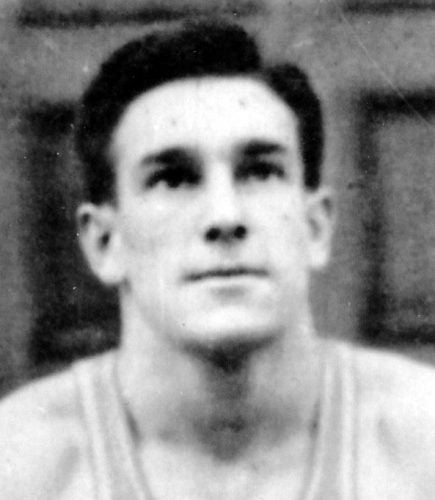- First Lieutenant
- WW II
Biography
John Joseph La Castro was born in New York, New York on 29 July 1917 and grew up in Saybrook, Connecticut. He was the son of James and Elizabeth La Castro. John graduated from Old Saybrook High School where he was an outstanding scholar and athlete. He entered Rhode Island State College (RISC) in September 1935 with the class of 1939. He was a member of Theta Chi fraternity, vice-president of the senior class, vice president of the RI Club, member of the sophomore hop committee, member of the basketball team and co-captain of the baseball team. John participated in the Army ROTC program while a student at RISC.
John graduated from RISC in June 1939 with a Bachelor of Science Degree in Science. John was a high school science teacher, basketball and baseball coach at Morgan School in Clinton, Connecticut and Guilford High School before returning to teach at Old Saybrook High School. He enlisted in the US Army Air Force Aviation Cadet Program on 27 October 1942.
Private John J. La Castro graduated from the ten-week U.S. Army Air Forces preflight training program, a combination of enlisted basic training and officer candidate school. He was assigned as a cadet at the Flying/Navigation Cadet Training Program, U.S. Army Air Force Training Center, Duncan Field, Alabama. The 20-week navigation training consisted of precision, dead-reckoning navigation with proficiency in pilotage, radio and celestial navigation. Upon completion of navigation school, he was awarded his Navigator Silver Wings, commissioned a Second Lieutenant and assigned to the 449th Bombardment Group (H), 717th Bomb Squadron, Grottaglie, Italy.
The 449th Bombardment Group, “The Flying Horseman,” a component of the 15th Air Force, flew 254 combat missions (B-24 Liberator Heavy Bombers) over Europe and Eastern Asia from January 1944 until May 1945. The Flying Horseman provided vital support to the allies by destroying aircraft-manufacturing and oil-producing facilities of the enemy. In addition, the 717th Bomb Squadron was also in France’s invasion as well as tactical war in Italy. Most of all, the 717th was enmeshed in combat missions targeting heavily defended European cities controlled by the enemy, such as: Vienna, Austria, Ploeste and Bucharest, Romania.
On the morning of 24 March 1944, First Lieutenant John La Castro, flying navigator in a B-24 Liberator “The Thunder Bay Babe,” left his base at Grottaglie, Italy with a large flight of the 449th Bombardment Group headed toward Steyr, Austria. The formation encountered heavy flak and bad weather forcing all planes to abort the mission.
As the planes began to return to base, it was noticed that the Thunder Bay Babe left the formation. The plane went down over Yugoslavia, near Mostra, Herzegovina, due to flak which had started a fire on board. The four airmen in the back of the plane bailed out and were taken as POWs. 1LT La Castro and the other five airmen in the front were killed in action. Before the fatal crash, he flew 23 combat bombing missions in the Thunder Bay Babe.
For his actions, First Lieutenant John J. La Castro, U.S. Army Air Forces, was awarded the Air Medal and Purple Heart (Posthumously). First Lieutenant John Joseph La Castro, U.S. Army Air Forces, was a hero in defeating the Germans in World War II. He was another son of Rhode Island and America who answered the call to duty and gave his life in service to our country. First Lieutenant John J. La Castro was laid to rest with full military honors in St. John’s Roman Catholic Cemetery, Old Saybrook, Connecticut. He is a heroic member of the “Greatest Generation.”
Education
1939

